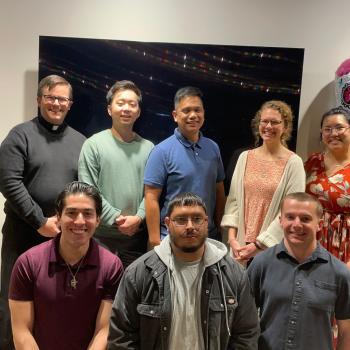Now Featured in the Patheos Book Club
Radical Spirit: 12 Ways to Live a Free and Authentic Life
by Joan Chittister
In the Rule of Benedict, a small document of seventy-three short chapters on how to live a holy and loving life, humility is about understanding and realizing the truth of the self. It is how we see ourselves that determines how we see and interact with others. It is how we respond to others that determines how we fare and what we become in the human community. And it is humility that stands to set us free. Free from the ambition that drives us, from the angers that rule us, from the greed that consumes us, from the chains we have mistaken for success and superiority.
Humility in the Rule of Benedict is the spiritual hinge on which the rest of life depends. The full truth of what it means to be spiritual, to be “of God,” to be a force in the world for equality, justice, compassion, and human dignity depends on what we mean by humility. In a world torn by violence and a social system built on always grasping for more, humility emerges as the glue that can finally unbind us from ourselves. Then, we are prepared enough to swathe society, family, personal relationships, community, and the human race with care, with justice, with the kind of love that makes life worthwhile for us all.
The Benedictine Rule—like all wisdom literature—is clearly meant for every age. Without the breadth of spiritual perspective this document brings, we are all left to stumble through life with no clear path, no clear goal. We limp along, always seeking God but forever wondering why we must struggle against the lust for perfection, why all the prayers we say are not enough to release us from the albatross of ourselves.
This book is about what it means to develop a deep and definitive spiritual life from day to day. It is ancient Benedictine spirituality that has been a filter through every age and is seen here through the filter of our own times and individual decisions and struggles.
This book asks what spirituality and humility can possibly mean to us now and in this age. It leads us to recognize that the roots of integrity, of peace, lie in the earthiness, in the humus, that is our nature.
In this book, each of the steps of humility is examined from three vantage points: First, I ask myself how my attitude toward these steps evolved in my own understanding as a Benedictine, as a woman, as a seeker, over the years. It has not always been a salient or simple process.
Second, I take each step of humility off the page and explore the issues and questions implied in each of them here and now. To understand what the ancients were really addressing and why they were dealing with it as a central part of the spiritual life. It asks, Is union with God really possible?
What happens to individuality if a person is humble? How does something as questionable as humility change the quality of life for the seeker as well as for the world around us? It looks at the prerogatives and pitfalls of a false independence. It questions whether humility doesn’t really suppress personal development. It looks for the difference between healthy pride and narcissism. It plumbs the place of human relationships in spiritual growth. It looks at the very modern questions that underlie the struggle with which each particular step of humility challenges us.
And finally, in the third segment of each chapter, I concentrate on the spiritual implications of humility for an individual’s ultimate and empyreal growth. It brings the wisdom of the ages to bear on the struggles that come with trying to negotiate between the ways of the world and the ways of God today.
This book shines a light on the way to profound peace between us and the passions that drive us. It brings into focus the juices, the energy, the desires that, good as they are, augur to propel us into darkness. It sensitizes us to the impulses in need of gentling in ourselves if we are ever to become the light of God we are meant to be for others.
And always, it explores the place of humility in an individual person’s spiritual life and the search for the fullness of personal human development.
It invites you to open up the dailiness of life and find God there. It invites you to become a “radical spirit,” to put down your chains, to opt for a life that is free and authentic.
Indeed, the message of Zosimas rings on here: The chains we struggle with are the chains we have forged for ourselves.
They are the chasms of fear and contempt, the greed and arrogance, the hunger and emptiness we have yet to fill with the kinds of things that give our souls wings.
Or, to put it another way, welcome to the eternal search for the fullness of life.
pp. 16-19
5/1/2017 4:00:00 AM




